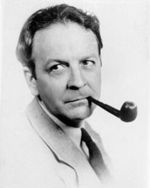Marlowe Resurrected
 The estate of Raymond Chandler and publisher Henry Holt & Company have agreed to release a new novel featuring Chandler's iconic detective creation, Philip Marlowe. They've chosen Booker Prize-winning author John Banville to pen the new novel, writing under his crime fiction pen name of Benjamin Black. Holt is also the publisher of Black's series of crime novels featuring a hard-drinking Dublin pathologist named Quirke.
The estate of Raymond Chandler and publisher Henry Holt & Company have agreed to release a new novel featuring Chandler's iconic detective creation, Philip Marlowe. They've chosen Booker Prize-winning author John Banville to pen the new novel, writing under his crime fiction pen name of Benjamin Black. Holt is also the publisher of Black's series of crime novels featuring a hard-drinking Dublin pathologist named Quirke.
Black said of the new endeavor, "I began reading Chandler as a teenager, and frequently return to the novels. This idea has been germinating for several years and I relish the prospect of setting a book in Marlowe’s California, which I always think of in terms of Edward Hopper's paintings. Bay City will have a slightly surreal, or hyper-real, atmosphere that I look forward to creating."
This isn't the first time an effort has been made to continue Chandler's Marlowe series, as Jeff Pierce over at the Rap Sheet notes. Uruguayan author Hiber Conteris and Robert B. Parker wrote Marlowe novels, and various writers contributed Marlowe short stories in the anthology Raymond Chandler's Philip Marlowe: A Centennial Celebration. Time will tell if Black's style is a good mesh with Chandler's literary vision.
In light of the announcement, I thought it would be fun to listen to a program the BBC did about Raymond Chandler on the 100th anniversary of Chandler's birth, in 1988. The first part is mostly introduction, although it includes a Q&A from 1958 with Ian Fleming chatting with Chandler (about a year before his death), which begins about 6:00 into the recording.
Chandler's frustration with being taken seriously as a writer of detective fiction is quite evident, as he once said about the Long Goodbye, "I may be the best writer in this country (the U.S.), and with two exceptions, I think I am. But I am still a mystery writer. For the first time in my life, I was reviewed as a novelist in the London Sunday Times and I was discussed on the BBC, but over here?"
It's a fun interview, including Fleming's admission that he never intended James Bond to be a hero, but more "a blunt instrument wielded by a government department who would get into bizarre and fantastic situations and more or less shoot his way out of them." Whereas Chandler says of Marlowe, "He's always confused. He's like me." Later, in part three, Chandler says of Marlowe, he wasn't based on the author, at least not deliberately. "If so, it just happened."
You can hear the second, third and fourth parts of the interview via YouTube, each segment about seven minutes long.





In Reference to Murder
- B.V. Lawson's profile
- 201 followers



